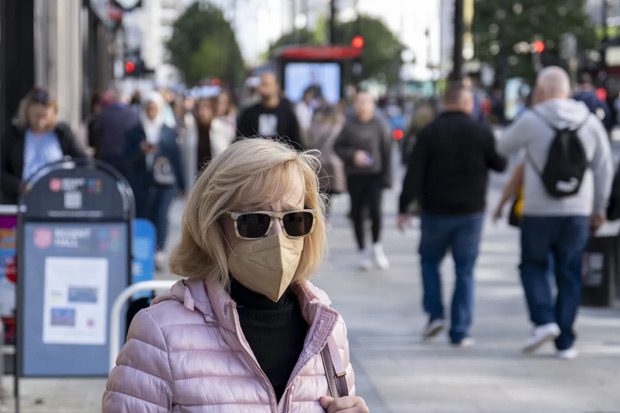COVID-19 raises the stakes for heart attacks, strokes, and even death long after infection, new study finds
Fortune,

Practically from the beginning of the COVID-19 pandemic, researchers and medical experts feared–and often loudly warned–that the virus wasn’t like other infections that people might encounter during, say, flu season. SARS-CoV-2 was different. It was worse. And the potential long-term effects, as we reported two years ago, were even more worrisome.
A new large-scale study puts those longer-range concerns into bold relief. The results are as unforgiving as many experts had hypothesized.
The study, involving nearly a quarter-million adults, found that those with any type of COVID-19 infection in 2020 had twice the risk of suffering a major cardiac event—a heart attack, stroke, or even death—in the three years after a diagnosis than those who weren’t infected.
People whose infections were severe enough to warrant hospitalization faced nearly a four times greater risk of a major cardiac event or death than the uninfected group.
“These findings are undeniable and extremely troubling,” says David Putrino, the director of the Cohen Center for Recovery from Complex Chronic Illness at Mount Sinai School of Medicine. “The significance of this work is that our current public health policy surrounding COVID-19 is inadequate. People need to be informed of the risks they are incurring to their long-term health by being repeatedly infected with SARS-CoV-2.”
There is a chilling truth to those words. While experts and major medical institutions still find themselves debunking myths about the virus and the vaccines developed to fight it, the longer-term research tells a story of lives irrevocably altered by COVID-19 infections and argues strongly for vaccination and other mitigations against the virus.
The study was published Oct. 9 in the American Heart Association’s peer-reviewed journal Arteriosclerosis, Thrombosis and Vascular Biology. The report’s authors and researchers analyzed data from the U.K. Biobank system, including the data for more than 8,000 adults who had a positive lab test for COVID-19 in 2020 and another 2,000 or so whose cases required hospitalization. Results were compared with nearly 220,000 adults in the database who were not diagnosed with COVID-19 during that time.
In the nearly three years following the acute infection in 2020, the study’s authors found double the risk of heart attack, stroke, and death compared with the uninfected group. Somewhat surprisingly, the elevated risks did not abate over the three years of study, suggesting a problematic staying effect.
“The two-fold increased risk observed in year one following infection was also seen in year two, and even year three,” says study author Stanley Hazen, chair of the Department of Cardiovascular and Metabolic Sciences at the Cleveland Clinic. “This was seen in all subjects independent of age, sex, or risk factors for cardiac disease.” (The ages of those in the study ranged from 50 to 86, with an average age of 67.)
What’s more, in a subset analysis of hospitalized cases without known heart disease, infection with the virus raised the risk for heart attack, stroke, or death to the same levels as individuals who had a history of heart disease, diabetes, or peripheral artery disease (PAD)—but not COVID-19.
“This is why we refer to COVID as a coronary artery disease risk equivalent,” says Hooman Allayee, principal investigator of the study and a professor at USC’s Keck School of Medicine in Los Angeles. “Getting severe COVID is just as bad for heart attacks and strokes as having pre-existing heart disease.”
Those I interviewed were quick to note a critical distinction and key limitation of the study: None of the individuals was vaccinated at the time of their infection, as COVID-19 vaccines were not available in 2020.
“The study didn’t look at the effects of COVID-19 vaccination on a person’s cardiovascular risk,” Hazen says. “I suspect that it would be protective, because vaccines usually keep COVID infections from becoming severe.”
Putrino agrees. “Our team has been consistently advocating for the public to focus on infection prevention strategies such as masking, clean air, and vaccination in order to best avoid acute SARS-CoV-2 infection,” he says. “The public should be educating themselves on the long-term risks associated with COVID infection.”
How COVID-19 elevates the risk for cardiovascular problems is the subject of much study and conjecture. Research into long COVID has highlighted the disease’s deleterious effects on the body’s normal functions over time, and some of the same factors may well be at work here.
“COVID-19 may lead to inflammation of endothelial cells (that line blood vessels),” says Ziyad Al-Aly, chief of research and development at VA St. Louis Health Care, whose previous work foretold many of the results from the U.K. Biobank study.
“It can also activate the complement system and increase the propensity to form clots; it may also destabilize or inflame plaques in the coronary arteries,” Al-Aly says. “These mechanisms may explain the significant increase in (cardiovascular) risk and the durability of that increase in risk over many years.”
Notably, the new study found that genetics also played a role. For example, hospitalization for COVID-19 doubled the risk of heart attack or stroke among individuals with blood types A, B, or AB, but didn’t change the risk for those with O blood type.
Allayee also says he would “very much like” to replicate the study’s major findings in additional populations, “since U.K. Biobank is mostly European whites.” He says the research group is already trying to get access to other datasets in order to do that.
But the findings are robust and pretty clear: COVID-19 infection raises the stakes with respect to heart attacks, strokes, and even death. That effect continues three years post-infection. And severe infections make those risks even worse.
We know from other studies that vaccination can reduce the severity of infection, the need for hospitalization, and the risk of death associated with COVID-19 infections. Yet in the U.S., about one in five people had not received a single COVID-19 vaccine shot as of last year, to say nothing of a full dose or an updated vaccine.
The study also found in a preliminary analysis that hospitalized COVID-19 patients who were already taking aspirin, did not have a significantly increased cardiovascular risk. That suggests that the risk can potentially be mitigated but still requires further study, says Allayee.
“I would use these data (from the study) as a sign to be more aggressive in prevention: healthy diet, exercise, controlling your blood pressure and cholesterol, stopping smoking,” says Sandeep Das, co-chair of the American Heart Association’s COVID-19 CVD Registry committee and a director at UT Southwestern Medical Center in Dallas. “I think this study should perhaps push some people out of complacency and into thinking about their longer-term risk.”
That process should involve vaccination. It may well mean more aggressive masking and paying attention to the air quality around one’s daily routines. But none of that can happen without an awareness that, as much as some people want to believe otherwise, COVID-19 remains an active threat to public and personal health, including your own history with the virus.
“You may have forgotten that you had COVID years ago, but it has not forgotten about you,” Al-Aly says, “Trivializing COVID as just a cold or an inconsequential nothing-burger is wishful thinking that does not align with scientific evidence.”
This article originally appeared on https://fortune.com/2024/10/11/covid-19-heart-attacks-strokes-death-long-after-infection-new-study-health/?abc123
